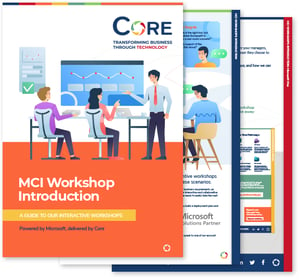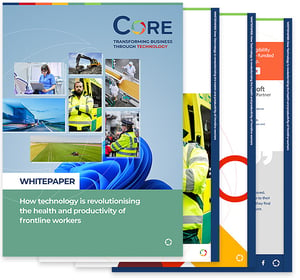In today’s fast-paced digital world, businesses are increasingly looking for ways to streamline operations, reduce manual effort, and enhance efficiency. Intelligent Process Automation (IPA) is at the forefront of this transformation, combining Artificial Intelligence (AI), Machine Learning (ML), and Robotic Process Automation (RPA) to drive smarter, faster decision-making.
If you missed our recent webinar on Intelligent Process Automation, don’t worry—you can catch the full recording on demand here. In the meantime, here’s a summary of what was covered.
What is IPA?
IPA takes traditional automation a step further, combining robotic process automation (RPA) with artificial intelligence (AI), machine learning (ML), business process management (BPM) and advanced analytics to automate complex business processes.
By incorporating technologies such as natural language processing, computer vision, and predictive analytics, IPA:
- Enhances decision-making by analysing large datasets in real time.
- Optimises workflows by intelligently routing tasks based on priority.
- Enables end-to-end process automation to reduce inefficiencies and improve business outcomes.
Why Does IPA Matter?
Traditional process automation has limitations—it requires structured inputs and predefined rules. However, most business operations involve unstructured data, emails, PDFs, and human interactions that require intelligent processing.
With IPA, businesses can:
✔ Improve accuracy – Reducing human errors in data processing.
✔ Speed up workflows – Automating repetitive, time-consuming processes.
✔ Reduce operational costs – Cutting expenses by up to 80% through automation.
✔ Enhance customer experience – Ensuring faster responses and better decision-making.
Real-World Use Cases of IPA
In our webinar, we explored various scenarios where IPA is making a significant impact, such as:
- Invoice Processing
IPA can help automate data extraction, validation, and approvals in finance, reducing manual effort and errors.
- Employee Onboarding
HR processes have been streamlined with automated document verification, system access provisioning, and training assignments.
- Fraud Detection
By analysing transactions in real time, AI-powered fraud detection helped businesses identify anomalies and prevent fraudulent activities.
- Regulatory Compliance & Reporting
IPA can support compliance by automating audit-ready reporting and running continuous compliance checks.
- Customer Service & Contact Centres
AI-powered chatbots and Microsoft 365 Copilot integrations enabled faster query resolution, improved interactions, and smarter workflow automation.
Agents & Automation
In our webinar, we briefly explored Microsoft Agents & Automation, as well as automation with other non-Microsoft partners. We explored Microsoft 365 Copilot as the UI for AI, focusing on three key agents categories:
🔹 Retrieval Agent – Gathers and processes data efficiently.
🔹 Task Agent – Executes predefined actions based on AI insights.
🔹 Autonomous Agent – Takes full control of an end-to-end workflow, reducing human intervention.
By leveraging Microsoft 365 Copilot as the UI for AI, businesses can build smarter RPA bots, unlock more value from data, and drive end-to-end process automation.
Technology Capabilities Powering IPA
The webinar recording also highlights several cutting-edge capabilities from non-Microsoft platforms that empower organisations to scale their automation efforts. Some examples include:
✔ AI-Powered RPA – Handling unstructured data with intelligent automation.
✔ Document Understanding – Extracting, classifying, and validating information from documents.
✔ Process Mining & Task Mining – Identifying automation opportunities through data-driven insights.
✔ Low-Code Development – Accelerating digital transformation with Liberty Create, from Netcall.
✔ Seamless Enterprise Integration – Connecting with platforms like Microsoft 365, SAP, and Salesforce.
✔ Scalability & Orchestration – Managing AI-powered bots centrally with UiPath Orchestrator.
The Business Impact of IPA
The results of implementing IPA speak for themselves through customer success stories, such as:
- 8% accuracy – AI-driven decision-making reduces errors and increases efficiency.
- 95% faster processing speed – Tasks that once took 40 hours are now completed in just 2 hours.
- 80% cost savings – Automating processes cuts operational expenses and improves compliance.
- £28bn industry savings – Large-scale automation reduces costs and enhances overall business productivity.
What's next?
The future of Intelligent Process Automation lies in custom AI agent development, workflow automation, and seamless Copilot integrations. To help businesses accelerate their AI and automation adoption, we also introduced the AI and Automation Funding Eligibility Assessment—a free 1-hour discovery workshop designed to help organisations unlock available funding for AI transformation.
Watch the webinar On-Demand
Want to see IPA in action and understand how it can transform your business? Empower your business with intelligent automation.
Click here to watch the full webinar recording, including a live demo.






